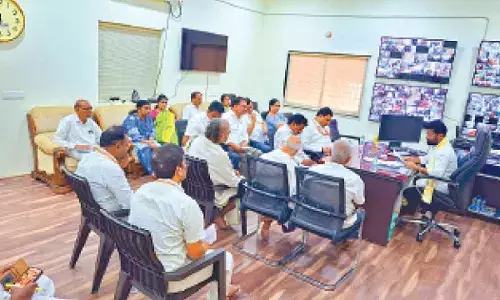Saudi Nitaqat Law Leaves Andhra Workers Facing Uncertain Future Amid Job Loss Fears

Thousands of workers from Andhra Pradesh, especially Kadapa, fear job loss under Saudi Arabia's Nitaqat law. With looming deportation or jail, workers are concerned about repaying high-interest loans taken to secure Gulf jobs.
Uncertain future awaits Saudi returnees: Three words Nitaqat (labour law), Huroob (running away from sponsor) and Iqama (residency permit) -- are as alien to thousands of Indians working in Saudi Arabia as the kingdom's deserts. But, of late, these three Arabic words are on everybody's lips because under a new Saudi labour law called Nitaqat, every Saudi employer has to compulsorily appoint one Saudi citizen for every 10 foreign workers who should have valid documents to stay and work. An estimated 2million Indians are working in Saudi Arabia and their jobs range from menial to executive and consultancy. Lakhs of them are from Andhra Pradesh and almost every district has its share of workforce in Saudi Arabia.
For instance, the Kadapa district from where thousands of labourers had gone there to work and make money for the betterment of their families and themselves. After spending lakhs of rupees, barrowed at high rates of interest, to secure visa, to pay agent fee, etc. they are now in the grip of fear of losing their jobs because of Nitaqat. The new Saudi law has been conceived to reduce the kingdom's dependence on expatriate workforce that constitutes 90 per cent of Saudi labour market that includes white and blue-collared jobs.
At the same time, the kingdom wants to open more employment avenues for Saudi citizens. Nitaqat was originally scheduled to come into force on April 3, but the Saudi Government deferred its enforcement by three months at the request of Indian and other labour exporting countries. This gesture is aimed at facilitating their respective embassies to tackle the anticipated rush of expatriates leaving Saudi Arabia once Nitaqat is implemented.
With the deadline fast approaching, those who have gone recently to Saudi Arabia from Andhra Pradesh in general, Kadapa district in general, are worried that if they return without making enough money, the high interest loans they had taken would make their lives miserable. If they stay back, they have to face the prospect of going to jail in an alien country when the government cracks down. They say either the State government or the Centre has not been coming to their rescue.
Over the years, even semi-literate workers have started spending lakhs of rupees to get Gulf Jobs in the hope of earning more money despite harsh working conditions. After working for a few years, they hope to have a secured future and educate their children well, as the wages in the Gulf are 5 to 10 times more than in the State.











